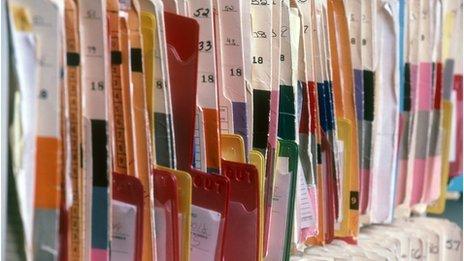Care.data: How did it go so wrong?
- Published
- comments

There comes a point when the weight of criticism becomes so much that the dam bursts.
For NHS England - and its Care.data project - that point was reached on Tuesday.
When you have a group of bodies as disparate as the British Medical Association, privacy campaign group Big Brother Watch and the Association of Medical Research Charities united in their condemnation, you know you have a problem.
The organisation has defused the problem for now by agreeing to delay the data-sharing project by six months.
But how did it get to this point? After all, the concept of the giant database has the backing of almost the entire medical community, many charities and some of the most influential patient groups.
While the furore over the scheme may have only exploded into life since Christmas, the actual idea has been 25 years in the making.
Since 1989, the NHS has been collecting data on hospital stays, known as hospital episode statistics (HES).
This has proved invaluable. For example, HES data played a role in uncovering both the Bristol heart and Mid-Staffordshire scandals.
It also provided some of the evidence that led to the introduction of targeted bowel cancer screening in 2006.
The idea with Care.data is to expand this database to include what happens to patients when they are under the care of GPs.
The belief is this could help researchers develop new treatments and improve the monitoring of performance.
But most would argue none of this was communicated by NHS England.
Video animation
Instead, the organisation focused its attention on a leaflet drop of every household in England.
The problem was many people could not recall getting them - a BBC poll last week suggested as many as two-thirds of the public had not seen them come through their letterboxes.
It is not clear exactly what happened here. NHS England says it agreed a deal with Royal Mail that they would hit 99% of households - the industry-considered standard for national mailouts - and the leaflets would not be nestled inside other mail.
But reports have emerged of them being found tucked inside pizza menus and other junk mail.
NHS England video about patient data plans
NHS England is now in discussions with Royal Mail to find out what happened.
A video animation was also produced (the video is on the right), but it went only on YouTube and NHS England's website.
There was no national TV campaign.
Nor was a press conference called to launch the marketing campaign.
That is unusual for a project on this scale.
Officials at the Department of Health, which until a year ago was in charge of the day-to-day running of the NHS, have told me they would never have run it like this.
'Hard sell'
Questions have also been asked about why a decision has yet to be taken about what some consider the most controversial aspect of the project - the sharing of data with private companies.
This will not be decided until a meeting in March. It meant the public were being asked whether they wanted to opt out without knowing who was going to get access to their largely anonymised medical records.
Unsurprisingly, there is now a lot of soul-searching at NHS England.
The organisation admits it made mistakes - particularly in not doing enough to explain the benefits of Care.data.
Some of the explanations offered are understandable. For example, there was a desire not to spend too much on marketing at a time when front-line budgets are being squeezed.
However, the challenge now for NHS England is to work out how they can move on.
One suggestion is that big money should be spent on a TV and radio campaign - although this could be seen as a "hard sell".
Some believe personalised letters should be delivered to households instead of the generic leaflets.
NHS England is also likely to explore the possibility of getting other organisations, such as patient groups and well-known charities, involved in explaining the scheme.
But the fear now inside the organisation - and among the many supporters of Care.data - is that the concept has become so tarnished that whatever is done now will be wrong.